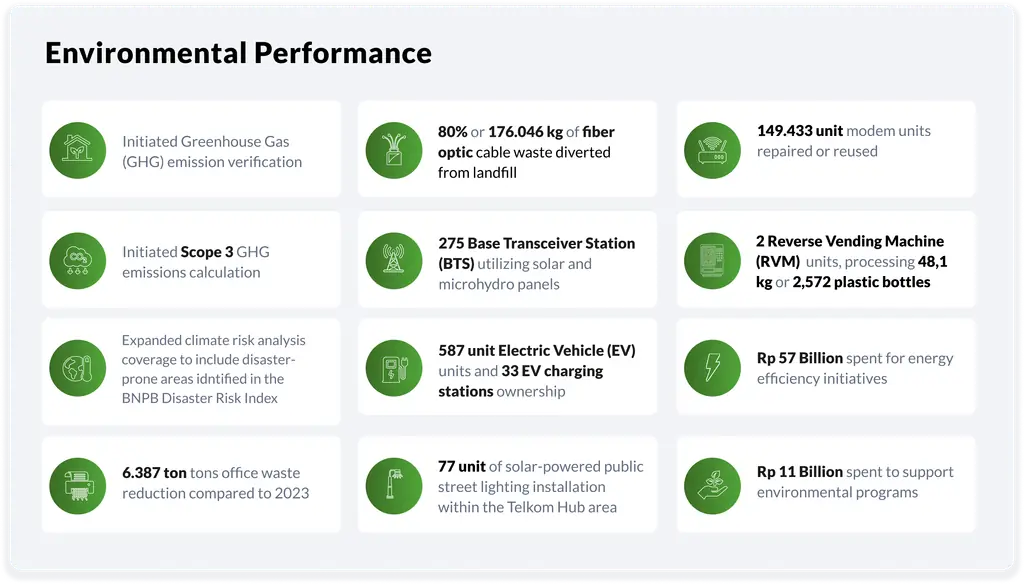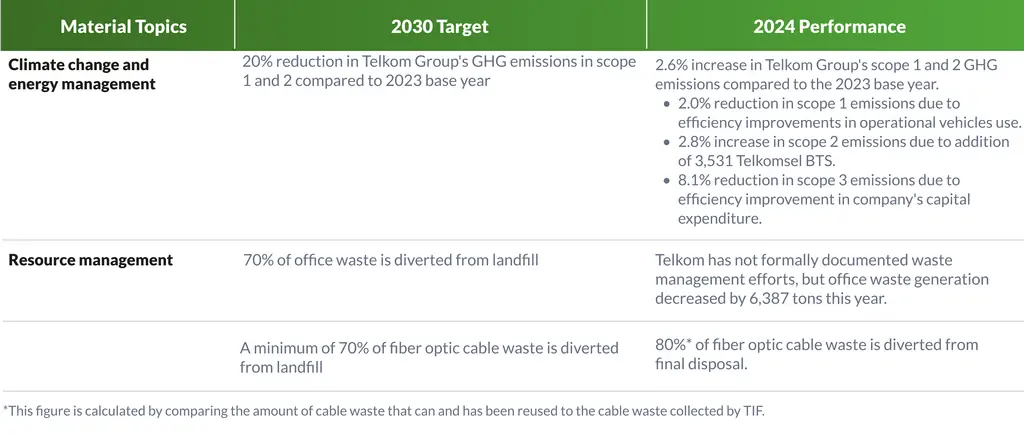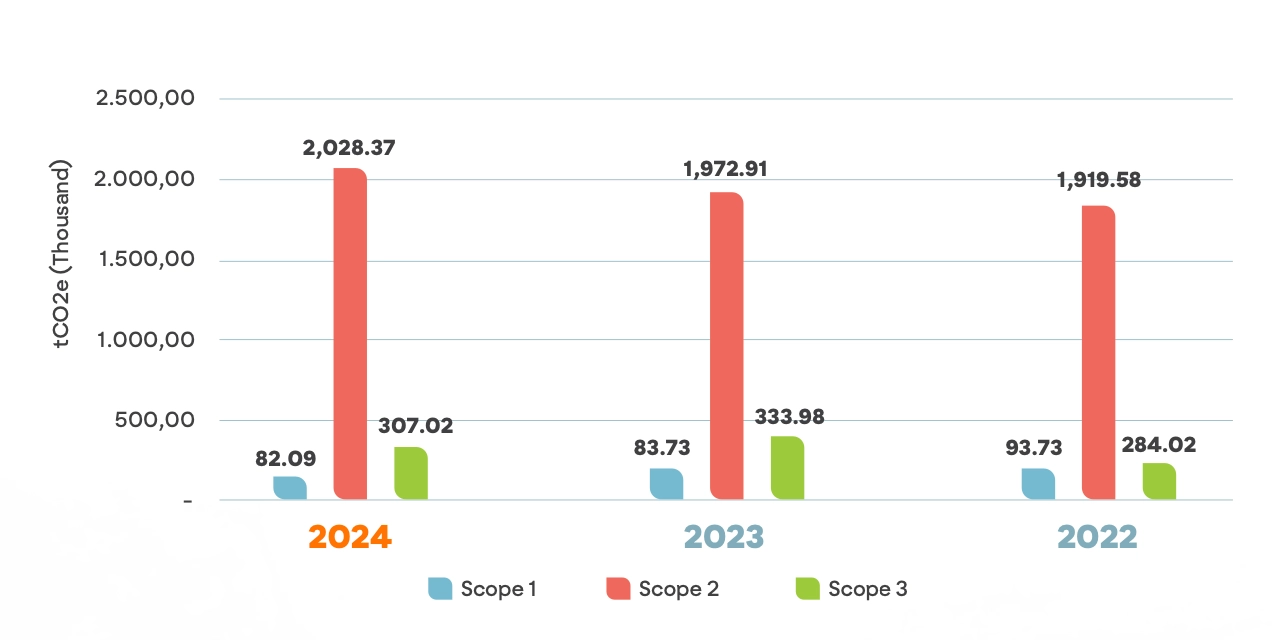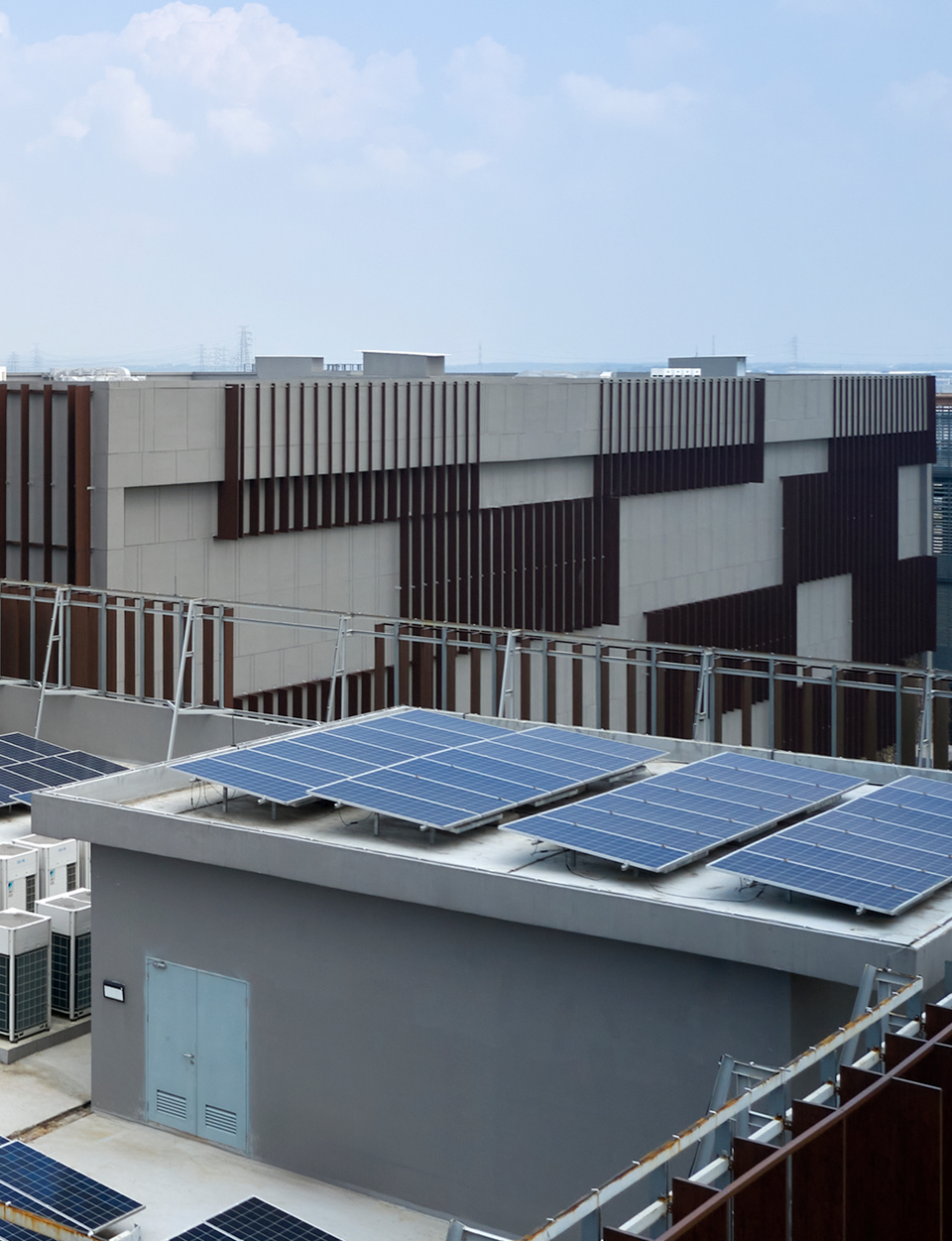Save Our Planet
Telkom is committed to playing a role in creating a greener ecosystem through sustainable business practices. We strive to minimize the environmental impact of our operations by focusing on climate risk management and waste reduction. In addition to these key areas, we also report on water management and biodiversity conservation to meet national disclosure standards.


TelkomGroup is committed to continuing to transform in sustainability efforts while supporting the government's target of achieving Net Zero Emission (NZE) in 2060, by setting decarbonization baselines and targets and carrying out a series of initiatives to reduce the carbon footprint which are summarized in the Telkom ESG Pillar framework - Right Environmental Approach.
Telkom Group acknowledges the increasing risk of climate change and its potential impact on all business lines, including service quality for customers. In response, Telkom initiated a climate risk assessment in 2023, incorporating the identification of climate risks and opportunities, as well as climate scenario analysis, to guide adaptation strategies. The methodologies, processes, results, limitations, and assumptions are detailed in the 2023 Climate Risk Report, in alignment with the IFRS S2 disclosure framework. Telkom has established a strategy to enhance business resilience to climate risks, including setting key metrics and targets, with GHG emissions as a main metric, which will be continuously monitored. Telkom's target includes Scope 1 and 2 emissions reduction by 20% by 2030, compared to the 2023 base year, and achieve net zero for Scope 1 and 2 emissions by 2030.
Telkom Group's commitment to energy efficiency is reflected in its investment, covering the procurement and retrofitting of LED lights, energy-efficient refrigerants, batteries, and low-energy monitors. As part of its commitment to transitioning toward a net zero emission, Telkom Group has deployed renewable energy at BTS and public facilities. Telkom Group has also expanded its use of electric vehicles (EVs) to support operational activities, complemented by providing EV charging station points. Currently, 17% of Telkom's total operational vehicle fleet consists of EVs.

Telkom's core operations rely on material resources, such as communication support equipment, to ensure the seamless delivery of services to customers. In the process, these activities produce waste that requires responsible management following sustainability principles.
One of the wastes generated by Telkom Groups operational activities is fiber optic cable waste. Telkom targets a minimum of 70% of fiber optic cable waste to be diverted from final disposal by 2030. Until 2024, it is recorded that the amount of fiber optic cable waste diverted from final disposal by TIF is 176,046 kg or 80% of the total cable waste. This figure is calculated by comparing the amount of cable waste that can and has been reused to the cable waste collected by TIF.
Telkom promotes digitalization by implementing a policy on the use and distribution of information through online system, such as online official memo, virtual meetings, joint files, online surveys, and IT-based HR services. This aims to maximize the digitalization efforts and IT adoption to reduce use of paper.
Telkom Group sources its water supply from the Regional Drinking Water Company (PDAM). Recognizing the potential environmental impacts associated with water use, Telkom Group is committed to implementing responsible water management practices across its operational buildings. To support this initiative, Telkom Group operates Sewage Treatment Plant (STP) facilities that process liquid waste through filtration stages. This ensures that wastewater discharged into urban sewer systems or recycled for reuse meets safety standards and does not contain grey or black water.
Telkom Group recognizes the environmental impact of its business operations, including GHG emissions and waste, as outlined in the previous section. As part of its commitment to environmental responsibility, Telkom actively participates in biodiversity conservation, despite not having operational areas directly in the conservation zones. Our responsibility is further reflected in the absence of public complaints related to environmental issues arising from Telkom's operations in 2024.
In 2024, Telkom facilitated the planting of 102,450 trees across a total area of 4.6 hectares, in partnership with local communities through Telkom's Hutan Binaan Digital program. In addition to terrestrial ecosystem conservation, Telkom is actively engaged in marine ecosystem restoration initiatives. In 2024, Telkom planted 62,250 mangrove trees (Rhizophora mucronata) and transplanted 896 coral reef substrates (Acropora sp and Porites sp) across multiple coastal areas in Indonesia.

